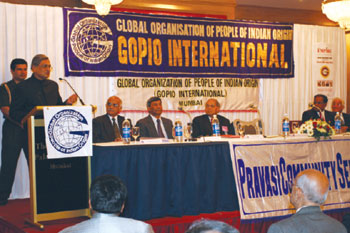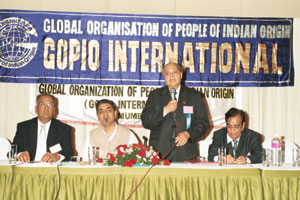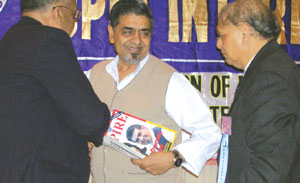| |
Tryst talk
With the creme de la creme footing it to the GOPIO meeting on the sidelines
of the Pravasi Bhartiya Divas in Mumbai, people of Indian origin have finally
found their place in the sun
By Dibyajyoti Chatterjee

ROOT ISSUE: Maharashtra Governor S.M.Krishna praised the
diaspora's interest in India |
|
The India chapter of the Global Organisation of People of Indian Origin (GOPIO)
was a milestone in the outfit's history because of many reasons. Some of the
standing demands of NRIs and people of Indian origin (PIO) have been met. In
June 2004, the Ministry of Overseas Indian Affairs was formed soon after the
United Progressive Alliance government took charge at the Centre. This is the
first time in the history of India that a separate ministry has been set up to
look into the grievances and necessities of the NRIs. And later in the beginning
|
|
of 2005, dual nationality, a
long-standing demand of the Indian diaspora was granted.
Applauding New Delhi's decision on dual nationality, GOPIO President Inder Singh
said, "We welcome the efforts of the Indian government. By granting dual
citizenship, it has accepted the long-awaited demand of the non-resident
Indians." Prime Minister Manmohan Singh announced the government's decision to
offer dual citizenship for all Indians who left the country after January 26,
1950, in the inauguration ceremony of the Pravasi Bharatiya Diwas held in Mumbai
in January.
GOPIO has been holding its Indian chapter's annual conference in conjunction
with the Pravasi Bharatiya Diwas over the last three years since the latter's
inception. NRIs and PIO, who have tasted success in business, politics,
academics and other professions in their respective countries, attended the
two-day GOPIO meet. For the first time PIO from countries like Suriname,
Trinidad & Tobago, Mauritius and Fiji attended. Among those who were inducted in
the growing membership of the GOPIO were Navnit Dholakia, the deputy leader of
the UK House of Lords, former Fiji Prime Minister Mahendra Chaudhry former
Trinidad & Tobago Prime Minister and leader of the opposition Basdeo Panday and
Malaysian Minister of Works Dato Samy Vellu.
The conference opened up business opportunities for many.
Subhash Goyal of the STIC travel group was looking to enhance travel and
tourism opportunities in India. N.J.Manekshaw, a security consultant from
Mumbai, was looking at possible tie-ups
In his address, GOPIO Chairman Dr Thomas Abraham said the relationship between
India and its diaspora should be governed by the consideration that each will
help the other, that India should be strong so as to enable them to derive
strength from this factor and that India should benefit from the tremendous
economic power from the 22 million strong diaspora located in 74 countries.
Since its inception GOPIO has been meeting in India once every year apart from
the conferences it holds in other countries. GOPIO has been actively involved in
campaigning for PIO Card and dual nationality. At the UN Conference Against
Racism and Racial Discrimination, GOPIO was accepted as an NGO.
Right from the very beginning, GOPIO has been actively involved in the human
rights issues of the Indian diaspora. The organisation had filed with the UN,
cases of human rights violations against the Indian community in Fiji and Sri
Lanka. Shortly after the Fiji crisis, GOPIO passed a resolution in the Zurich
convention. It says that when any person of Indian origin is abused, attacked or
discriminated against in any part of the world because of his or her ethnicity,
the entire Indian community will deem such an attack directed against them and
will fight together for justice.
GOPIO members expressed the need to be officially recognised to voice their
demands in the country. In response, Minister of Overseas Indian affairs Jagdish
Tytler said the necessary action would be taken.
|
|
In this connection, former Trinidad & Tobago
Prime Minister Basdeo Panday emphasised that the members of GOPIO should work
towards building India's image in the world. He also suggested that members
should take up philanthropic and developmental activities in the country. Adding
to this, Inder Singh said the GOPIO would mobilise NRIs and PIO to help the
tsunami victims.
Mahendra Chaudhry urged that India should take an assertive stand when human
rights of the diaspora are violated. "Fiji Indians were indenture and
now |
|

DRUMMING UP SUPPORT: GOPIO President Inder Singh calls for
tsunami fund at the conference's inaugural session
|
|
they are suffering from the violation of political
rights," added Chaudhry. Basdeo Panday expressed his concern for the Indians
living in Trinidad, Suriname, Guyana and other countries because the diaspora is
not well organised though some progress has been made by GOPIO.
Taking a cue, GOPIO President Inder Singh said GOPIO chapters have been started
in several cities in Europe and urged the participants to help in networking
with the diaspora in Europe by opening chapters in all cities of Europe. Using
the opportunity, Neena Gill, the only Indian-born member of the European
Parliament, advised the Indian community living abroad to be active participants
in the country they live in.
Among those who called for strengtheni ng ties and increasing networking with
the Indian diaspora were L.M. Singhvi, former Indian high commissioner to the UK
and Ramesh L. Maharaj, former law minister, Trinidad & Tobago. Maharaj is an
international human rights lawyer having more than 30 years of experience. A
senior counsel in Trinidad & Tobago, he also practices law in the Caribbean. His
legislative agenda against international drug trade and organised crime has
earned him accolades from across the globe, including former US Attorney General
Janet Reno and UN Secretary General Kofi Annan.
On the second day of the conference, Chandresh Sharma, Member of Parliament,
Trinidad & Tobago called for the setting of a 'Youth GOPIO'. The objective is to
make the youth of Indian origin proud of their Indian identity. Also the new
entity will forge friendly terms between the youths of Indian origin. It was
acknowledged that till date there has been no international forum for them to
come together and also they have no real contact with India except through some
Bollywood movies. So it was felt that a Youth GOPIO will facilitate in forming
relationships among the young and also give an opportunity to showcase their
talents.
In a special session held for the media from various countries, M.A. Faried
Pierkhan, a media magnate from Suriname talked about his efforts to revive and
popularise Hindi in his country. Pierkhan is vice-president, Rapar Broadcasting
Network N.V., a company that runs newspapers, television stations and four FM
radio channels. Suriname has a huge ethnic Indian population which migrated from
the north as indentured labourers in the 19th century. With the help of 24-hour
radio and TV channels, Pierkhan offers his viewers a wide range of Hindi songs,
movies and news from Bollywood.
Mustafa Ajmeri from Atlanta is a distributor of three ethnic newspapers in the
northern US. The conference gave him an opportunity to scout for partnerships
for distributing Indian journals in the US.
The two-day conference also opened up business opportunities for many. Subhash
Goyal of the STIC travel group was looking at boosting tourism opportunities in
India. He co-chairs the FICCI committee on civil aviation and is also the
president of Confederation of Tourism Professionals of India. N.J. Manekshaw, a
security consultant from Mumbai, was looking at possible tie-ups. Rajkumar Dhoot
of the Videocon group looked for increasing business in other parts of the
world.
Amidst other business meetings, several resolutions were passed that included
the demand for Rajya Sabha seats for NRIs, voting rights for Indian citizens
living outside the country and repealing the VCA clearance rules for NRIs for
adoption of orphaned children from India.
GOPIO, a prelude to the Pravasi Bharatiya Diwas, undoubtedly created more
opportunities for greater interaction between the Indian industry, academics,
and media with the diaspora.
The German Connection
When the German political elite picks it business delegations, you can bet
your bottom dollar that Dwarkesh Shah will be in it. Just who is he?
|

JOB DONE: Dwarkesh Shah, Jagdish Tytler and Inder Singh |
|
Dwarkesh Shah, a resident of Stuttgart, Germany,
chairman of the GOPIO's Business Council, played the part assigned to him with
aplomb. He chaired the session on business, technology and investments at the
conference.
A business magnate and a darling of the German political establishment for its
major business delegations, he is seen as an integral part of a business
delegation. Till date he has had attended hundreds of such meets across the
globe, winning confidence of
|
|
clients and partnering countries. He has
accompanied
the most senior German ministers and influential people from
conglomerates for big business meetings in Europe and Asia. The list of people
who have tagged him along is endless and includes German Chancellor, Gerhard
Schröder. He invited Shah to join his delegation to India and China.
In 1968, Shah established a company Imexma GmbH, Stuttgart that manufactures and
exports printing and packaging machines. A couple of years later he ventured
into portfolio management and investments, when he established another company
Shah GmbH, Stuttgart, Investment Holding in 1976. In India, he started a
chemicals company, Shah-Chemie-Handels GmbH, in 1985. Over the years Shah's
business interests in India grew and was involved in manufacturing of printing
and packaging machines, investment holdings, trading and publishing. Shah was
invited as a Member of the German business-delegations to Asian countries since
1994 twice a year led by German Foreign Minister and Economic Minister.
Once in 1993, Shah managed with the publisher of Deutscher Drucker to bring out
a special issue on India. In 2002, GWZ (State Economic Ministry Organisation),
Stuttgart recommended Shah as speaker to the conference of the CII-Delegation
before GZW. Shah is member of the governing board of foreign and wholesale trade
association in Baden-Württemberg, Stuttgart, since 1994.
A Gujarati, Shah had basic education in Halol, Gujarat. Later came to Mumbai for
higher studies. He went to Jai Hind College and worked his way through
the college.
|
|
|
|